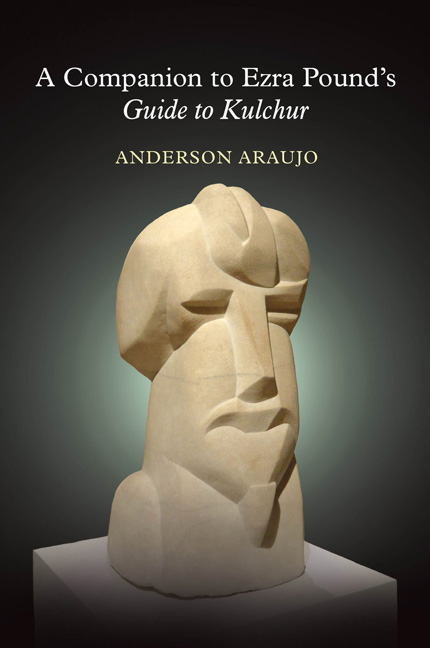Book contents
- Frontmatter
- Contents
- Acknowledgments
- Abbreviations
- Introduction
- Guide to Kulchur
- Part I
- Section I
- Section II
- Part II
- Section III
- Section IV
- Part III
- Section V
- Section VI
- Part IV
- Section VII
- Section VIII
- Section IV
- Part V
- Section X
- Section XI
- Part VI
- Section XII
- 53 Study Of Physiognomy
- 54 And Therefore Tending
- 55 Pergamena Deest
- 56 Watch The Beaneries
- Section XIII
- Addenda: 1952
- Notes
- Index
53 - Study Of Physiognomy
from Section XII
- Frontmatter
- Contents
- Acknowledgments
- Abbreviations
- Introduction
- Guide to Kulchur
- Part I
- Section I
- Section II
- Part II
- Section III
- Section IV
- Part III
- Section V
- Section VI
- Part IV
- Section VII
- Section VIII
- Section IV
- Part V
- Section X
- Section XI
- Part VI
- Section XII
- 53 Study Of Physiognomy
- 54 And Therefore Tending
- 55 Pergamena Deest
- 56 Watch The Beaneries
- Section XIII
- Addenda: 1952
- Notes
- Index
Summary
R. L. Stevenson … Virginibus Puerisque: Stevenson's 1881 collection of philosophical essays on a range of subjects (cf. note GK 133).
Romantic poetry … concept of reincarnation: Pound's point may be gleaned in Wordsworth's “Ode: Intimations of Immortality from Recollections of Early Childhood,” published in its final edited form in 1815. Wordsworth enlists elements of the Platonic doctrine of metempsychosis, naturalizing loss and offering hope of spiritual rebirth.
I assert that the Gods exist: In “Axiomata,” published in The New Age of January 13, 1921, Pound declares, “God, therefore, exists … Concerning the intimate essence of the universe we are utterly ignorant. We have no proof that this god, Theos, is one, or is many, or is divisible or indivisible, or is an ordered hierarchy culminating, or not culminating, in a unity.” Canto 113 puts it less ambivalently, “The Gods have not returned. ‘They have never left us.’ / They have not returned. / Cloud's processional and the air moves with their living” (113/807).
Mr Eliot … What Mr P. believes?: A shorter version of the question Eliot had posed in a 1928 review of Pound's Personae (1926), “What does Mr. Pound believe?”In his prose polemic, After Strange Gods (1934), Eliot takes Pound to task for his cosmopolitan Confucianism and “post-Protestant prejudice,” deeming Pound's vision of Hell in A Draft of XXX Cantos “a perfectly comfortable one for the modern mind to contemplate.” Pound's gibe about Eliot's “nest of frousty and insular parsons” alludes to his friend's Anglo-Catholic faith, to which Eliot formally converted in 1927.
Ovid's long poem: Ovid's Metamorphoses (cf. notes GK 149–50, 272). For Pound, Ovid's poem is not “a poetic fiction,” Surette argues, quoting from a letter Pound wrote to his father in 1927, but “a metaphor for the relationship between the human and the divine, the third subject of the Cantos, ‘the magic moment’ or moment of metamorphosis, burst thru from quotidien into ‘divine or permanent world.’”
- Type
- Chapter
- Information
- A Companion to Ezra Pound's Guide to KulcherGuide to Kulcher, pp. 312 - 316Publisher: Liverpool University PressPrint publication year: 2018

